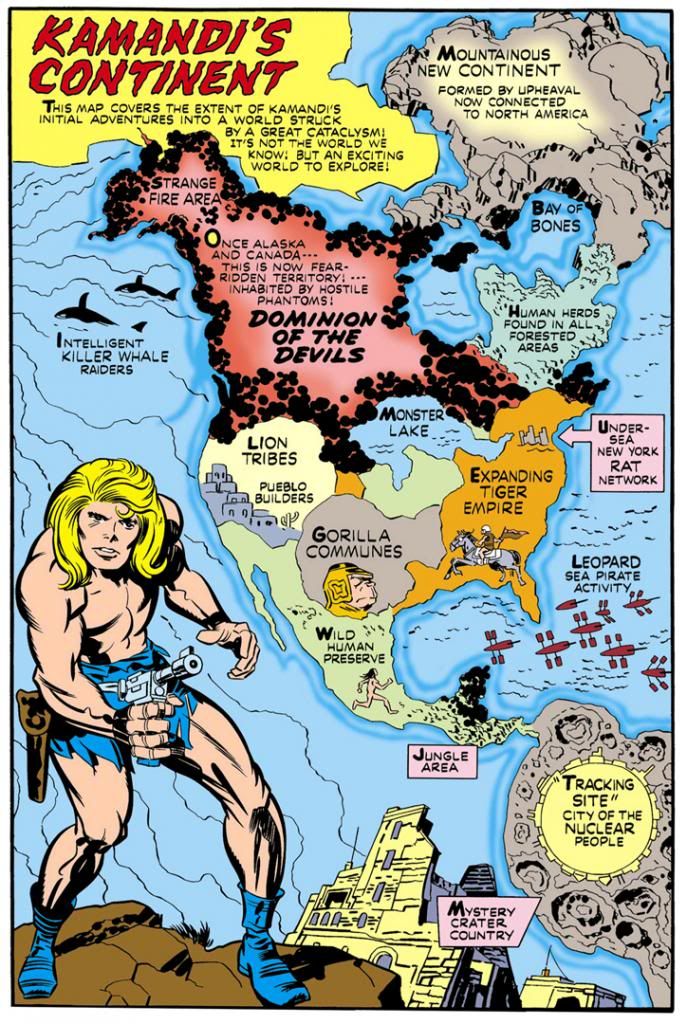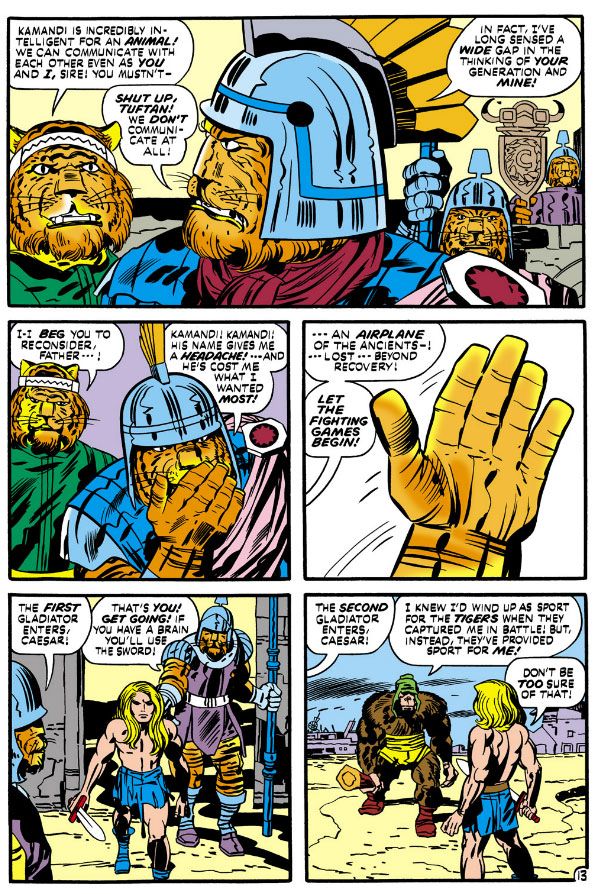If you'll get out your well-worn copy of Kamandi #1, you'll find a map of the post-Great Disaster western hemisphere, containing all of North and parts of South America. Oh, here it is.
Pretty different from today, huh? Now look at the east coast. Notice how Kirby labels it not just the "Tiger Empire," but the "Expanding Tiger Empire." Look out, Gorilla Communes! Lead by the appropriately-named Great Caesar, the tigers aren't content just to consolidate their rule over everything from what was once the New England states to where New Orleans used to be. They're aggressively expanding, waging war against the leopards and, eventually, the gorillas. And the gorillas are communists? What gives, Kirby?
Kirby's feline warriors are all visually striking, but the tigers are the most impressive. They're clad in Romanesque armor and the first time we see them, they're launching a huge cavalry charge against the leopards. Their war sweeps Kamandi up in its wake and he ends up a prisoner of Great Caesar, then a pampered pet (for about a page). Dr. Canus helps our hero and his glorious hair escape. Great Caesar isn't through with Kamandi by any means. I don't know about you, but the last thing I want is an entire Tiger Empire on my ass day and night. I don't think I'd sleep a wink.
Great Caesar has a teenaged son named Prince Tuftan. Tuftan, like many teenagers of all species, is a burr in his father's fur. You know, one of the worst things about being a parent is when your kid starts hanging around with the wrong crowd. My son got involved with certified public accountants, and the next thing my wife and I knew, he'd cut his hair, donned a suit and tie and started going all over the town with his gang auditing company accounts and offering sound financial advice. Because his father is anti-Kamandi, Tuftan's youthful rebelliousness requires him to become pro.
They meet in the shattered remnants of Las Vegas (in Kamandi #4, March 1973). It's the 60s-70s Vegas, so feel free to imagine the bones of the Rat Pack lying somewhere in the detritus of the American dream. Tuftan takes a few pot-shots at Kamandi before they both end up captives of the gorillas. Kamandi does his best Andy Defresne impression and ends up crawling directly into Tuftan's cell via the ventilation system. The human seems about to lose his mind, but the young cat appears content to chill. After a single conversation, Kamandi and Tuftan become good friends. They still bicker and spar, but when Great Caesar shows up, Kirby shows us those 20th century problems between parents and kids are eternal.
Poor Great Caesar.
Kirby liked to throw generational conflict into his stories. Remember "The Glory Boat" from New Gods #6 (January 1972)? Of course you do. It's only my single favorite issue of that title, so I'm assuming you hold it in similarly high regard. Lots of father-son angst in that one. For that matter, how about almost the entirety of the New Gods series? The generation gap is a major theme, with the sins of the fathers being visited upon the children and all kinds of parental nightmares running throughout all the Fourth World books. And that includes Superman's Pal Jimmy Olsen. On covers Jimmy was forever knocking the crap out of the older mentor-figure Superman, usually in the company of a bunch of drop-out culture types. Hippies, motorcycle gangs, newsboys. You can find age-based clashes in Fantastic Four and more than likely in at least one or two of those kid gang books Kirby did with Joe Simon. So it's only natural Kirby would revisit this in a comic starring a teen and give the would-be conqueror Caesar a kid like Tuftan.
This helps give nuance to Kirby's animal characters. Along with Dr. Canus, Tuftan proves Kamandi isn't going to be a book simply about a lone boy fighting against talking animals. It's evidence of Kirby's humanism. Even his exotic furred people are just that-- people. Recognizable in their complexity, their strengths and frailties. We can fault his expository dialogue and occasionally corny humor, but there can be no doubt of Kirby as a superior storyteller and observer of human behavior. I'd argue these elements are often under-appreciated in his work in all the focus on the bombast and other elements that make Kirby so uniquely Kirby.



No comments:
Post a Comment